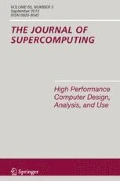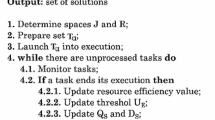Abstract
When the workflow application is executed in Service-Oriented Grid (SOG), performance issues such as service scheduling should be considered, to achieve high and stable performance in execution. However, most of the prior works on workflow management neither study the performance issues nor provide evaluation methodologies on the performance of Grid Services. Therefore, it is infeasible to apply for the service scheduling problem in SOG. In this paper, we propose and model evaluation metrics for the Grid Service performance. The metrics are extracted based on common properties of Grid Services and are used to quantify and evaluate the performance of an individual Grid Service. With these metrics, we develop a service scheduling scheme with a list scheduling heuristic, to choose proper and optimal Grid Services for tasks in workflow applications. It ensures high performance in the execution of the workflow applications. In addition, we propose a low-overhead rescheduling method, referred to as Adaptive List Scheduling for Service (ALSS), to adapt to the dynamic nature of a grid environment. ALSS provides stable performance for workflow applications, even in abnormal circumstances. Finally, we design an experimental environment with actual traces and perform simulations to quantify the benefits of our approach. Throughout the experiments, we demonstrate that ALSS outperforms conventional scheduling methods. Our scheme produces a scheduling performance that is superior to AHEFT by 50.2%, SLACK by 50.8%, HEFT by 68.3%, MaxMin by 72.0%, MinMin by 71.0%, and Myopic by 69.8%.
Similar content being viewed by others
References
Foster I, Kesselman C, Nick JM, Tuecke S (2002) Grid services for distributed system integration. Computer 35:37–46
Foster I, Kesselman C, Nick JM, Tuecke S (2003) The physiology of the grid. In: G.F.T.H. Fran Berman (ed), Grid computing, pp 217–249
Jia Y, Buyya R (2005) A taxonomy of workflow management systems for grid computing. J Grid Comput 3:171–200
Fahringer T, Jugravu A, Pllana S, Prodan R (2005) ASKALON: a tool set for cluster and grid computing. Concurr Comput Pract Exp 17:143–169
Malewicz G, Foster I, Rosenberg A, Wilde M (2007) A tool for prioritizing DAGMan jobs and its evaluation. J Grid Comput 5:197–212
Singh G, Deelman E, Mehta G, Vahi K et al (2005) The Pegasus portal: web based grid computing. In: Proceedings of the ACM symposium on applied computing, ACM, 2005, pp 680–686
Ludächer B, Altintas I, Berkley C, Higgins D (2006) Scientific workflow management and the Kepler system. Concurr Comput Pract Exp 18:1039–1065
Kandaswamy G, Fang L, Huang Y, Shirasuna S (2006) Building web services for scientific grid applications. IBM J Res Dev 50:249–260
Neubauer F, Hoheisel A, Geiler J (2006) Workflow-based grid applications. Future Gener Comput Syst 22:6–15
Peltz C (2003) Web services orchestration and choreography. Computer 36:46–52
Marek W, Radu P, Thomas F (2005) Scheduling of scientific workflows in the ASKALON grid environment. SIGMOD Rec 34:56–62
Anirban M, Kennedy K, Koelbel C, Marin G et al (2005) Scheduling strategies for mapping application workflows onto the grid. In: High performance distributed computing, 2005, HPDC-14, Proceedings 14th IEEE international symposium, pp 125–134
Blythe J, Jain S, Deelman E, Gil Y el al (2005) Task scheduling strategies for workflow-based applications in grids. In: Cluster computing and the grid, CCGrid, 2005 IEEE international symposium, vol 2, pp 759–767
John W, Jeffrey M, Jaap S (2004) Utilification. In: Proceedings of the 11th workshop on ACM SIGOPS European workshop, Leuven, Belgium, 2004. ACM Press, New York, p 13
Eilam T, Appleby K, Breh J, Breiter G (2004) Using a utility computing framework to develop utility systems. IBM Syst J 43:97–120
Zhao H, Sakellariou R (2004) A low-cost rescheduling policy for dependent tasks on grid computing systems. In: Grid computing. LNCS, vol 3165. Springer, Berlin, pp 21–31
Yu Z, Shi W (2007) An adaptive rescheduling strategy for grid workflow applications. In: Parallel and distributed processing symposium, IPDPS 2007. IEEE International, New York, pp 1–8
Berman F, Casanova H, Chien A, Cooper K (2005) New grid scheduling and rescheduling methods in the GrADS project. Int J Parallel Program 33:209–229
Yu-Kwong K, Ishfaq A (1999) Benchmarking and comparison of the task graph scheduling algorithms. J Parallel Distrib Comput 59:381–422
Junwei C, Jarvis SA, Saini S, Nudd GR (2003) GridFlow: workflow management for grid computing. In: Cluster computing and the grid, proceedings, CCGrid 2003, 3rd IEEE/ACM international symposium, pp 198–205
Frey J, Tannenbaum T, Livny M, Foster I, Tuecke S (2001) Condor-G: a computation management agent for multi-institutional grids. In: High performance distributed computing, 2001, proceedings 10th IEEE international symposium, pp 55–63
Dulescu RA, Arjan JCVG (1999) On the complexity of list scheduling algorithms for distributed-memory systems. In: Proceedings of the 13th international conference on supercomputing, Rhodes, Greece, 1999. ACM Press, New York, pp 68–75
Topcuoglu H, Hariri S, Min-You W (2002) Performance-effective and low-complexity task scheduling for heterogeneous computing. IEEE Trans Parallel Distrib Syst 13:260–274
Shi Z, Dongarra JJ (2006) Scheduling workflow applications on processors with different capabilities. Future Gener Comput Syst 22:665–675
Sekhar D, Dharma PA (1998) Optimal scheduling algorithm for distributed-memory machines. IEEE Trans Parallel Distrib Syst 9:87–95
Rashmi B, Dharma PA (2004) Improving scheduling of tasks in a heterogeneous environment. IEEE Trans Parallel Distrib Syst 15:107–118
Yang T, Gerasoulis A (1994) DSC: scheduling parallel tasks on an unbounded number of processors. IEEE Trans Parallel Distrib Syst 5:951–967
Maheswaran M, Ali S, Siegal HJ, Hensgen DAHD, Freund RFAFRF (1999) In: S. Ali (ed), Heterogeneous computing workshop (HCW ’99) eighth proceedings, 1999, pp 30–44
Deelman E, Blythe J, Gil Y, Kesselman C (2003) Mapping abstract complex workflows onto grid environments. J Grid Comput 1:25–39
Zhao H, Sakellariou R (2003) An experimental investigation into the rank function of the heterogeneous earliest finish time scheduling algorithm. In: Euro-par parallel processing. LNCS, vol 2790. Springer, Berlin, pp 189–194
He C, Du B, Li S (2003) Grid services performance tuning in OGSA. In: Advanced parallel processing technologies. LNCS, vol 2834. Springer, Berlin, pp 373–381
Guo L, McGough AS, Akram A, Colling DACD (2007) Enabling QoS for service-oriented workflow on GRID. In: McGough AS (ed) Computer and information technology, 7th IEEE international conference, 2007. IEEE Press, New York, pp 1077–1082
Litke A, Konstanteli K, Andronikou V, Chatzis S, Varvarigou T (2008) Managing service level agreement contracts in OGSA-based grids. Future Gener Comput Syst 24:245–258
Kesselman C, Foster I, Tuecke S (2001) The anatomy of the grid: enabling scalable virtual organizations. Int J High Perform Comput Appl 15:200–222
Krishnan S, Wagstrom P, Laszewski GV (2002) GSFL: a workflow framework for grid services, Argonne National Laboratory, 9700 S. Cass Avenue, Argonne, IL 60439
Francisco Curbera RK, Nagy WA, Weerawarana S (2006) Implementing BPEL4WS: the architecture of a BPEL4WS implementation. Concurr Comput Pract Exp 18:1219–1228
Casanova H (2001) Simgrid: a toolkit for the simulation of application scheduling. In: Cluster computing and the grid, first proceedings IEEE/ACM international symposium, 2001, pp 430–437
Wolski R (2008) NWS Time Correlated Traces. Available from: http://pompone.cs.ucsb.edu/~rich/data/
Author information
Authors and Affiliations
Corresponding author
Rights and permissions
About this article
Cite this article
Chin, S.H., Suh, T. & Yu, H.C. Adaptive service scheduling for workflow applications in Service-Oriented Grid. J Supercomput 52, 253–283 (2010). https://doi.org/10.1007/s11227-009-0290-9
Received:
Accepted:
Published:
Issue Date:
DOI: https://doi.org/10.1007/s11227-009-0290-9




